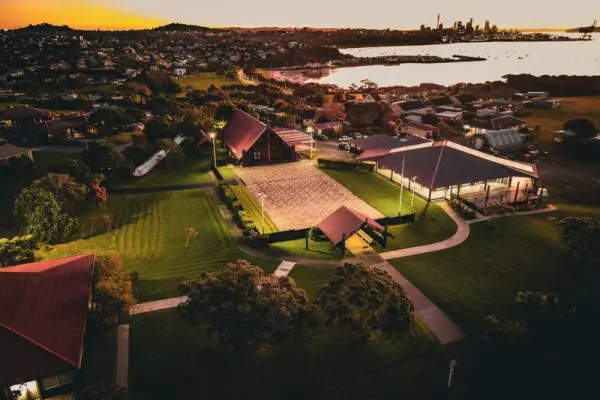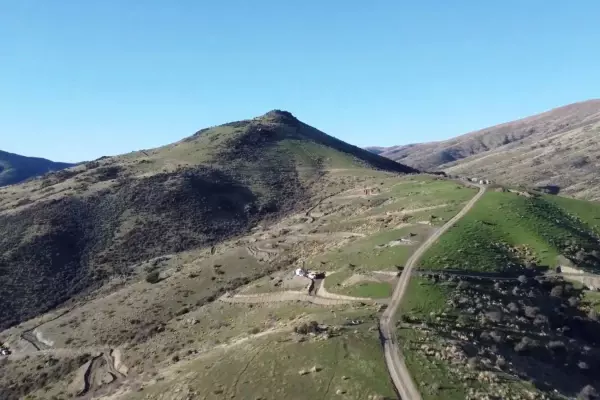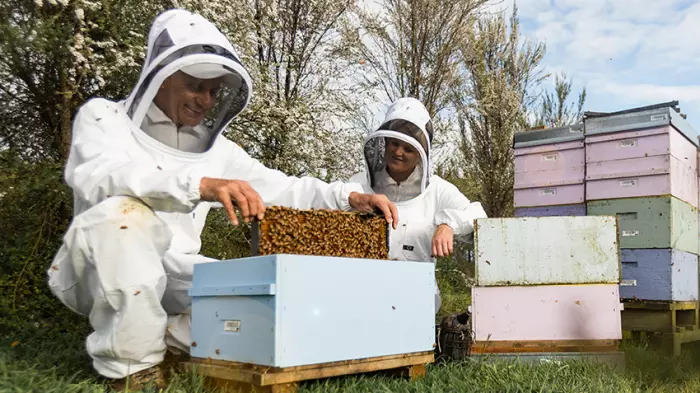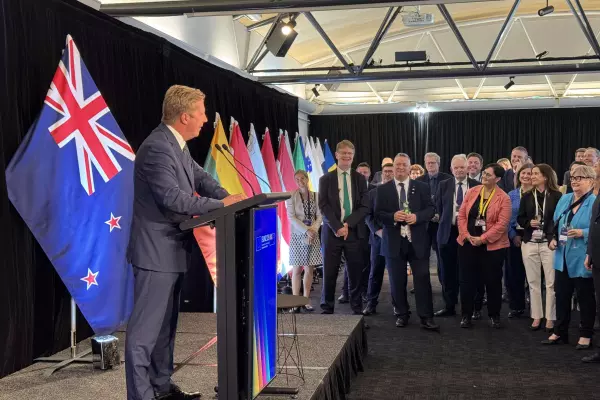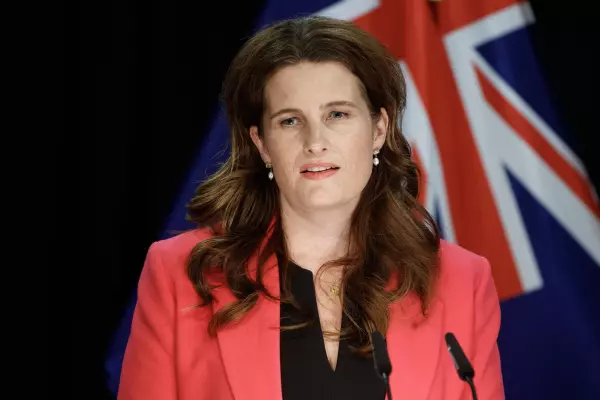Being free from the Labour party's control was the big theme behind Meka Whaitiri's shock announcement on Wednesday morning.
At an event in the Hawke's Bay, Whaitiri announced she had left Labour to join Te Pāti Māori and would stand for it at the general election.
Te Pāti Māori president John Tamihere and co-leaders Debbie Ngarewa-Packer and Rawiri Waititi all gave speeches at the event, and parts of Tamihere's remarks included a reference to the idea that politicians who were members of Labour were also controlled by the party.
'Free at last'
Tamihere also drew on community leader Robert Whaitiri's use of Martin Luther King's "We are free, free at last" quote in the past.
"In 2004, there's no doubt that Tariana Turia walked the floor and she walked the floor on a catalyst issue and it galvanised our people in protest.
"Today, nearly 20 years after that event, Meka does a totally different kaupapa, she's coming home to her whakapapa.
"She's crossing the floor, to cross the bridge to her own emancipation, from being controlled by others to a party that she controls."
BusinessDesk understands the choice of venue for the announcement was deliberate.
Waipatu marae in Heretaunga is Whaitiri's marae, but it was also the first place to host the Māori government Te Kotahitanga in 1892 – a movement that tried to unify Māori across tribal lines into a single government but was never officially recognised by the crown.
Within her speech, Whaitiri made reference to the opportunity the party would give her to be closer to her whakapapa (genealogy), a reference not just to family connections and ancestry but to having more of an ability to advocate on behalf of Māori rather than being tied to advocating for the interests of her previous political party.
Shortly after the event, acting prime minister Carmel Sepuloni said the Whaitiri had been stripped of her ministerial portfolios and the government was disappointed at the news but had moved on.
Three temporary appointments had taken over Whaitiri's ministerial portfolios: Kieran McAnulty would take over as lead minister for cyclone recovery, Ayesha Verrall would assume food safety, and Damien O’Connor would take over Whaitiri's role as minister of customs.
Sepuloni said Whaitiri's associate portfolios would return to the lead portfolio minister.
Whaitiri's announcement caught the government off-guard, with prime minister Chris Hipkins on a long-haul flight to the king's coronation when the news broke on Tuesday evening.
Sepuloni's office was forced into issuing a holding statement which left the door open to the news potentially being a misunderstanding.
Political “curveball”
At the event on Wednesday morning, Whaitiri said she had informed the Speaker of her decision to resign from Labour on the morning before the announcement.
However, Speaker Adrian Rurawhe denied this and said he had simply received an email that said Whaitiri would be sitting with Te Pāti Māori MPs and would no longer be giving her proxy to the Labour party.
This meant her seat would not be automatically made vacant, as would have happened had she submitted an official resignation, and for parliamentary purposes, Whaitiri would be treated as an independent MP.
Te Pāti Māori's Tamihere said the previously nominated candidate running for the party in Ikaroa-Rāwhiti, Heather Te Au-Skipworth, had already agreed to step down to allow Whaitiri to run for the seat.
The move makes Te Pāti Māori's return to parliament ever more likely, even if it does not reach the 5% threshold, as it would leave the party with three sitting electorate MPs contesting the upcoming general election.
A BusinessDesk poll of polls has shown Te Pāti Māori would hold the balance of power on current polling – a balance they are likely to tilt in Labour's favour – unless NZ First was able to win the Northland seat.
Whaitiri won 55.6% of Ikaroa-Rāwhiti's electorate votes at the 2020 election, her next closest competitor secured 30.9% of the votes. However, party support for Labour sat at 67.3% of the vote.
Associate professor in politics at Victoria University of Wellington, Lara Greaves, said the Māori seats were often dominated by local feeling, and unless you were actually living in the electorate, it was very difficult to predict how the community might vote during a general election.
“All sorts of curveballs can happen in the Māori electorates.”
Greaves said it would be interesting to see if the support for Labour waned, as Ikaroa-Rāwhiti was typically a safe seat for the party.
“It will be an interesting election in Ikaroa-Rāwhiti as Labour will need to find a candidate quite quickly and I imagine there will be a lot of community Māori talent willing to put their hand up.”
Greaves said Whaitiri had “a good shot” at keeping her seat but was not guaranteed to win again.
“It’s hard because it’s the age-old question about how much people are voting for the party versus voting for the candidate.
“Part of it will obviously be her relationships, her whakapapa, her connection to the community, but part of it is the Labour party brand.”
The parties would likely still have to work together post-election, so that could be challenging, she said.
Political commentator Ben Thomas said this was an unprecedented move from Whaitiri and there did not appear to be any motive for it. In his opinion, the government had kept most of its promises to Māori.
Thomas said there could potentially be lingering resentment from a period in 2018 when then-prime minister Jacinda Ardern removed Whaitiri from cabinet after bullying accusations surfaced and were investigated by the Department of Internal Affairs.
At the time, then-leader of the opposition, Simon Bridges, said Ardern's decision had removed Whaitiri from cabinet but left her "in charge of Labour's powerful Māori caucus".
"Not only is the prime minister supporting someone who has shown no remorse but someone who denies anything happened," Bridges said at the time.
Graeme Edgeler, a political law expert, said there probably would not be a byelection for the seat, but acknowledged it was technically a possibility.
He said there were no major legal implications from the resignation other than that the decision would slightly change the amount of funding Labour received.
“When Jacinda Ardern resigned, the house voted ‘yes, we won’t hold a byelection’.
"This is probably what they’ll do.”
Whaitiri’s decision: 'My whakapapa is calling me home'
An emotional Whaitiri told those in attendance at Waipatu the decision was now in their hands.
She spoke of the importance of being back at her marae and the home of many great rangatira (leaders).
Whaitiri wanted to continue her ancestors’ work in protecting Māori land and said her decision wasn’t an easy one but it was all because of whakapapa.
“Today, I’m acknowledging my whakapapa and it’s calling me home.”
Whaitiri joins Te Pāti Māori with solid political experience since first being elected nearly a decade ago in a byelection, joining the 50th NZ parliament.
In her official government biography, she said her passion for Māori governance grew from her experience within parliament.
She was a senior adviser to the late Parekura Horomia who was minister of māori affairs and held the electorate from 1999 until his death in 2013.
Whaitiri succeeded Horomia in Ikaroa-Rāwhiti after the 2013 byelection. At the time, she was the chief executive of Ngāti Kahungunu.
Her official Labour party biography said her goal was to support and provide for the people of Ikaroa-Rāwhiti by rebuilding regional economies and ensuring whānau had the chance to work locally.
In 2018, Whaitiri was accused of bullying allegations and was stripped of ministerial duties after a report found it was probable that she grabbed her press secretary, who was left with bruising.
Labour legacy: last days were “very special”
Whaitiri's final days as a Labour minister were spent with veterans and her community on the East Coast.
Whaitiri was at the Napier RSA on Anzac Day talking to Cyclone Gabrielle heroes who had rescued people from rooftops, according to her recently disabled social media account.
She also attended the Rissington Anzac Service and described it as “very special”.
The community was heavily affected by the cyclone, and she described the locals as having “immense resolve” as they had created a place of remembrance amongst the devastation.
“The amount of work done since I last visited, nothing short of amazing.
“Like our veterans, the community of Rissington are serving each other well and continue to face their challenges as a community. He mihi nui ki a koutou. (Many thanks to you all)”
Putting ego aside
Tamihere described the event where Whaitiri announced her decision as a momentous occasion for Māori and Aotearoa, bringing Ngāti Kahungunu together.
He also acknowledged Te-Au Skipworth’s decision to step aside and allow Whaitiri to run for Ikaroa-Rāwhiti.
“To put your ego aside and awhi your cousin, it shows the mana of Heather to do that.”
Tamihere said it also took enormous courage for Whaitiri to make her move because she was walking away from a sure thing and towards the unknown.
Te Pāti Māori co-leader Debbie Ngarewa-Packer said transformational decisions like Whaitiri’s were important to the lifeline of Te Pāti Māori.
“This is her freedom. This is a turning point.”
Te Pāti Māori co-leader, Rawiri Waititi also welcomed Whaitiri to the political party and said it represented a period of change for Māori.
“Today the time for change belongs to Ikaroa-Rāwhiti.
“Today the time for change belongs to Māori.
“Today the time for change belongs to Aotearoa.”





